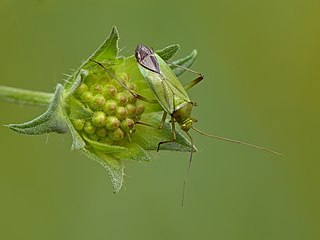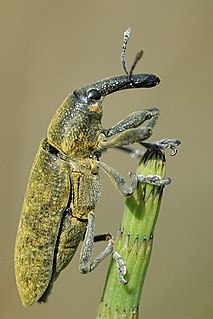
The narrow-bridged musk turtle is a species in of turtle in the family Kinosternidae. The species is endemic to Central America and Mexico.
Procambarus angustatus was a species of crayfish in the family Cambaridae. It was only known from the type specimen, described by John Lawrence LeConte in 1856. He reported that it "lives in lesser Georgia, in the rivulets of pure water which flow between little sand hills". It was endemic to the U. S. state of Georgia, but is now believed to be extinct.
Diplacus angustatus is a species of monkeyflower known by the common names purplelip pansy monkeyflower and narrowleaf pansy monkeyflower.
Lucerapex angustatus is a species of sea snail, a marine gastropod mollusk in the family Turridae, the turrids.
Lucerapex is a genus of sea snails, marine gastropod mollusks in the family Turridae, the turrids.

Calocoris is a genus of true bugs in the Miridae family.
Parholaspididae is a family of mites in the order Mesostigmata.

Lixus angustatus is a species of weevil found in Europe and the Mediterranean Basin. The general size of the weevil is about 5.5 mm. The coloration of the weevil is brown and green.

The Polyctenidae are a rarely collected family of parasitic bugs of the superfamily Cimicoidea. Polyctenidae species or bat bugs are obligate, hematophagous ectoparasites of bats. These insects are not to be confused with cimicid bat bugs, which are members of the family Cimicidae. A significant relationship appears to soccurbetween the family groups and the species of hosts that indicates co-evolution and specialization.

Cychrus angustatus is a species of ground beetle in the subfamily of Carabinae. It was described by David Heinrich Hoppe and Christian Friedrich Hornschuch in 1825.
Brachinus angustatus is a species of ground beetle from the Carabinae subfamily that can be found in Spain and North African countries such as Algeria and Morocco. Brachinus angustatus was one of the many beetles found in the collection of Count Pierre François Marie Auguste Dejean
Logisticus is a genus of beetles in the family Cerambycidae, containing the following species:
Parablabicentrus angustatus is a species of beetle in the family Cerambycidae, and the only species in the genus Parablabicentrus. It was described by Henry Walter Bates in 1866.
Sthenias angustatus is a species of beetle, part of the family Cerambycidae. It was discovered and described by Maurice Pic in 1925.
Cymus angustatus is a species of true bug in the family Cymidae. It is found in Central America and North America.
Macrodactylus angustatus is a species of scarab beetle in the family Scarabaeidae. It is found in North America. A yellow beetle with an elongate shape and long legs, it is 7-10mm long, and may be found on shrubs. Its range is Massachusetts to Indiana in the north, and south to Florida and Texas.
Harmostes angustatus is a species of scentless plant bug in the family Rhopalidae. It is found in Central America and North America.
Eugnamptus angustatus is a species of leaf rolling weevil in the beetle family Attelabidae. It is found in North America.
Platynus angustatus is a species of ground beetle in the family Carabidae. It is found in North America.
Aspergillus angustatus is a species of fungus in the genus Aspergillus. It is from the Nidulantes section. The species was first described in 2016. It has been isolated from mangifera indica root in Mali.




